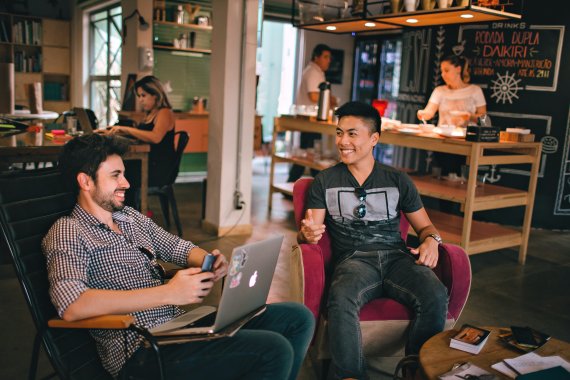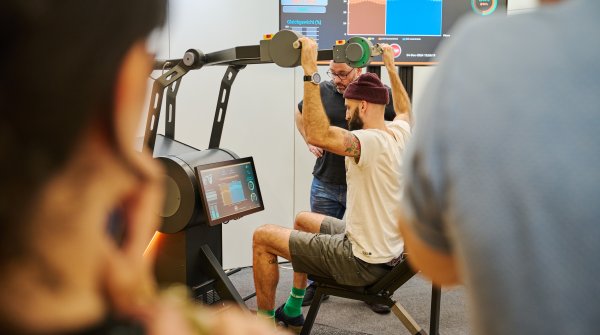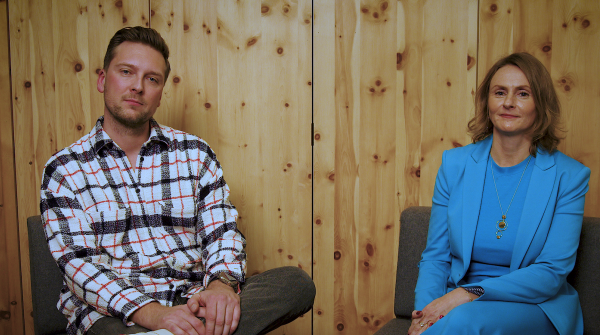The various presentations made it very clear once again what we have all known for a long time: Corona was not good for us. Especially not for our mental health. The isolation, restrictions and uncertainty during the pandemic have left their mark on many of us.
Fortunately, the topic of mental health is being given an ever bigger stage.
In the keynote "Coaching 2.0" with a focus on mental health, Ireen Wüst, former Dutch speed skater, gave personal insights into how the perception of mental health in sport has changed. She talked about her experiences with psychotherapy and how this developed from a taboo subject to a recognized part of her training routine.
"In the past, you didn't go to a psychologist. Of course you went to a physiotherapist or orthopaedist, but you didn't do that for your mental health. So when I started psychotherapy, I was afraid to go out in public. I went through the back door to my psychologist after work to talk to him. But at the end of my career, it was natural to go there because you wanted to perform and so you needed to perform well mentally."
Many people have found another way out during the pandemic, explained Rudy Trobrillant, Brand Consultant and Ambassador at HOKA, in the panel "How mental health demands new outdoor experiences":
"With the pandemic, people wanted to experiment and get outside. Many different sports such as hiking, climbing and trail running became more popular. People didn't just want to run in cities, they wanted to see and connect with nature."
What does this mean for brands? They now have to respond to the changing demands of consumers. The main focus is on making the outdoors an experience for more people. Be it through functional yet stylish products that make the outdoors suitable for everyday use or more accessible, or through inclusive offers, explained Marco Cassanmagnano, Head of Communication at Oakley:
"One of the things we do in a very practical way is to get people into the outdoors. We have created a platform called 'Community Days'where we hold events all over the world. We get people on the mountain, in the snow, and let them experience something that feels unattainable or difficult."
However, the social responsibility of brands does not stop here, according to Patrick Seitter, Head of Congresses & Academy, ESB Marketing Network in his presentation "ISPO meets top sports: New Deal: Sponsoring and Social Responsibility".
"Sport writes the best stories", explained the expert to the audience that this is precisely the task of brands in the field of sports marketing: To tell these stories too. Why? Sports sponsorship in Germany still has room for improvement, which makes sports sponsorship all the more important. Brands pay attention to three KPIs when selecting sponsorship opportunities: Brand Experience/Purpose (70%), Community (45%), Conversion (20%). And so companies often target influencers who are already big names in order to sponsor them. This makes sports marketing reactive.
Patrick Seitter's appeal to audiences and brands: "Sports marketing needs to be proactive and promote people who you believe in and who fit the brand, but who are not necessarily well-known yet. It is our responsibility to tell the stories of athletes who deserve it.
And who tells these stories? All the people behind the scenes of the big brands. And what role does work-life balance play for them? Marco Grund, health and performance coach & freelance lecturer, revealed in his keynote speech on "Employee wellbeing with 'Balanced Performance': How healthy leadership attracts and retains young talent ", that he avoids the term work-life balance, "because [he] only has one life, and work is part of it." And he is right. Especially if you take a look at the priorities of the next generation. Because they see it similarly, even more strictly. For 70% of young employees, the importance of health in the workplace is an important criterion when choosing an employer. Why is that?
The demands are constantly increasing, both in the world of work and in private life. On the one hand, the complexity of work tasks and private relationships has increased. On the other hand, our world is changing ever faster and developing its own dynamics that are beyond our control, such as global warming or the financial crisis. This mixture of growing dynamism and complexity brings with it a number of challenges and is referred to as "dynaxity" or "dynaxity". And this is stressing people out more and more.
Marco Grund presented a solution in his keynote speech with the concept of "Balanced Performance". This means above all for managers:
- Listening and not just talking
- Building trust with employees and gaining their trust
- Providing security and orientation
- Empowering the team

While companies here can focus on the mental health of their employees, we see a completely different problem in other parts of the world. This was demonstrated by Dr. Anne-Marie La Rosa, Shafiqul Islam and Martine Riblan, who asked the question in their panel talk: "Are workers in Bangladesh well protected against work-related injuries?" The answer is as simple as it is sad: no.
Even 10 years after the tragic Rana Plaza disaster, Bangladesh is the only one of the top 20 ready-made garment (RMG) exporting countries with no form of social insurance, not even for work-related injuries.
At ISPO Munich 2023, a solution was presented: the EIS (Employment Injury Scheme) pilot. A transformative initiative whose vision is a national shift towards a comprehensive protection system with effective remedies. The task of the pilot project: the scheme pays compensation to people who are permanently unable to work and also supports the relatives of deceased employees. This applies to all 4 million employees in Bangladesh's export-oriented garment industry.
How is this possible? Through voluntary contributions from participating brands. Puma, Montagne and the Oberalp Group are already setting a good example and supporting the pilot project. For Martine Riblan, Sustainability Specialist at Oberalp, this is "a no-brainer" and sets an example for other brands:
"We made the decision because we very much believe in the fact that we also have a responsibility in terms of our sources and decision-making, but also because we are genuinely interested in the well-being of the workers*."
From the seamstress in Bangladesh to the employees in the offices and sponsored athletes to the customer, brands must live their responsibility for well-being. So: Listen to the needs of customers, empower employees and become part of EIS-Pilot!
- Awards
- Mountain sports
- Bike
- Fitness
- Health
- ISPO Munich
- Running
- Brands
- Sustainability
- Olympia
- OutDoor
- Promotion
- Sports Business
- Textrends
- Triathlon
- Water sports
- Winter sports
- eSports
- SportsTech
- OutDoor by ISPO
- Heroes
- Transformation
- Sport Fashion
- Urban Culture
- Challenges of a CEO
- Trade fairs
- Sports
- Find the Balance
- Product reviews
- Newsletter Exclusive Area
- Magazine









